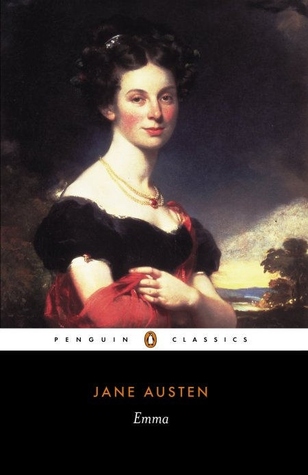 Emma is the March book of the month for the digital book club over at The Deliberate Reader. You read the book the month before so that you're done with it (or almost done with it) by the time the discussion month rolls around.
Emma is the March book of the month for the digital book club over at The Deliberate Reader. You read the book the month before so that you're done with it (or almost done with it) by the time the discussion month rolls around.I've read Pride and Prejudice from Austen before, but none of the other ones. I have to admit that while many people fawn over the Colin Firth film adaptation, I really do like the Kiera Knightley one. And I liked P&P as a book, too. I'd also picked up one of those nice, leather-bound (well, probably faux leather) with gold edges collected Austen books over Thanksgiving, so I was looking forward to reading Emma, which also fulfilled a category for both my Popsugar and romance reading challenges.
Unfortunately, I didn't really like Emma. Most of this is because I didn't like Emma herself. Austen's books, to my knowledge, all basically revolve around moderately-well-off people looking to marry other moderately-well-off or even well-off people, and the comedies of manners that ensue. They're mildly mocking of this polite society. Emma is no different in this. The eponymous Emma Woodhouse is a young woman who lives with her widowed father, following the marriage and departure of her older sister. Emma's former governess and companion has also recently married, a match that Emma fancies she helped along, and she decides to start playing matchmaker for others, namely a young woman living at a nearby boarding school, Harriet Smith.
The problem is that Emma is absolutely insufferable. She can't see anything beyond what she's built up in her own head, and she's incredibly classist. "Well, of course," you might say. "Think of her background, the time period!" But to that I say, No. Yes, Emma came from a well-off background. But Harriet, who is a bastard daughter, has no claims to any class, and yet Emma deems the man who loves Harriet, and who Harriet genuinely loves in return, to be too low-born for her. She has so many pretensions and prejudices that honestly Pride and Prejudice might have been a better title for this one than for the book about Lizzie Bennett! Austen is perfectly aware of this, of course, and it's part of the point of the book--it's all part of the way that Austen makes a point about the society she writes about. The other characters are all very skeptical of Emma and her actions and pretensions, raising eyebrows and sometimes working directly to counter her when she gets a little too crazy about the matchmaking. But Emma was still too annoying, not taking into the consideration the thoughts or genuine feelings of anyone else, instead thinking that she knows better than everyone and that only what she has decided on knows about.
Other than that, the book is charming. Of course it is. Austen creates a quaint little village that's embroiled in a series of love affairs (though they are, of course, perfectly appropriate love affairs) and the gossip and entanglements that those affairs bring with them. Mr. Knightley is a wonderful hero, and definitely too good for Emma; it's hard to say what he saw in her, honestly. Mr. Woodhouse is completely absurd, which is the point, with his hypochondria and concerns that eating an apple that hasn't been baked three times will lead to an untimely death. And then there's Jane Fairfax, who is a perfectly bland and boring person until she's not. All of this was basically exactly I was expected; it was just marred by a main character who I couldn't stand. Maybe if Emma had actually learned a lesson from all of this, it would have been different, but it wasn't--instead, she just proceeded to get whatever she wanted, regardless of how she walked over other people in order to do it.
I've read Pride and Prejudice, so I know how good Austen can be. Emma definitely hasn't put me off reading her other works, but this was not the best reading experience I've had.
2 stars out of 5.
Hi Chelsea,
ReplyDeleteMy name is Robyn, I am affiliated with The Writer's Workout. I would like to discuss a guest opportunity with you. Could you please email me at robyn.cross@writersworkout.net at your earliest convenience.
Thank you,
Robyn Cross